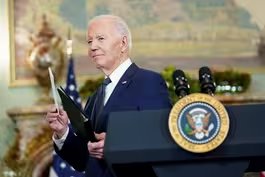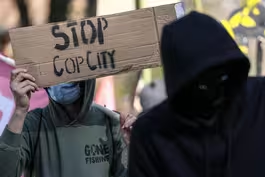
Brooks and Capehart on Biden's meeting with Xi
Clip: 11/17/2023 | 10m 59sVideo has Closed Captions
Brooks and Capehart on what Biden accomplished in his meeting with Xi
New York Times columnist David Brooks and Washington Post associate editor Jonathan Capehart join Amna Nawaz to discuss the week in politics, including what President Biden accomplished during his meeting with Chinese President Xi, polls showing growing disapproval of the U.S. response to the Israel-Hamas war and compromise on Capitol Hill helps avert a government shutdown.
Problems playing video? | Closed Captioning Feedback
Problems playing video? | Closed Captioning Feedback
Major corporate funding for the PBS News Hour is provided by BDO, BNSF, Consumer Cellular, American Cruise Lines, and Raymond James. Funding for the PBS NewsHour Weekend is provided by...

Brooks and Capehart on Biden's meeting with Xi
Clip: 11/17/2023 | 10m 59sVideo has Closed Captions
New York Times columnist David Brooks and Washington Post associate editor Jonathan Capehart join Amna Nawaz to discuss the week in politics, including what President Biden accomplished during his meeting with Chinese President Xi, polls showing growing disapproval of the U.S. response to the Israel-Hamas war and compromise on Capitol Hill helps avert a government shutdown.
Problems playing video? | Closed Captioning Feedback
How to Watch PBS News Hour
PBS News Hour is available to stream on pbs.org and the free PBS App, available on iPhone, Apple TV, Android TV, Android smartphones, Amazon Fire TV, Amazon Fire Tablet, Roku, Samsung Smart TV, and Vizio.
Providing Support for PBS.org
Learn Moreabout PBS online sponsorshipAMNA NAWAZ: The Biden administration's foreign policy efforts are at center stage this week, while, here at home, some compromise on Capitol Hill, but big funding questions ahead.
We turn now to the analysis of Brooks and Capehart.
That is New York Times columnist David Brooks, and Jonathan Capehart, associate editor for The Washington Post.
And welcome to you both.
It's good to see you.
Let's jump right into foreign policy, and that big meeting between Presidents Biden and Xi, a year in the making, a year of rising tensions between the two nations.
Jonathan, the bar for success for that summit was low, I think it's fair to say, just reestablish communications and reset.
Did they meet that bar?
JONATHAN CAPEHART: I think they did meet that bar.
I mean, yes, this meeting was a year in the making.
It was a meeting that had to happen.
It was a meeting that, quite frankly, I think the world was happy to see.
You can't have the two global superpowers at each other's throats, as they have been over the last year, with Chinese military planes buzzing U.S. military planes, and other things that have been happening.
And so the fact that President Xi came to the United States at the APEC conference, or outside the APEC conference in San Francisco, met with the president of the United States, had what seems like, looks like good meetings, it's all for the good.
They need -- China and the United States need to talk to each other.
Even if they are in competition with each other, they still need to talk to each other.
AMNA NAWAZ: David, what were your key takeaways from that summit?
DAVID BROOKS: Yes, I found it quite heartening, actually.
Like so many people, I have been alarmed by the intense military buildup China has been doing.
Their military spending has been really expanding at an explosive pace.
And because of their superior manufacturing base, in many ways, they can outdo us.
So, for example, they can produce 21 nuclear subs a year.
We can struggle to get one or two.
And that military buildup made me think, you don't spend that much money unless you're thinking of doing it.
And Xi clearly wants to take over the whole -- Taiwan at some point in his reign.
And so I was looking at possibly at another war, yet another war in the world sometime in the next year.
And that looks a lot less likely, in part because Xi clearly projected, understand there's been a shift in the balance of power over the last year.
The Biden administration has done a good job building alliances, but, most importantly, the Chinese economy is suffering.
For the first time in 40 years, the U.S. economy is growing faster in the Chinese economy.
The Chinese economy has the -- this real estate crash.
And so it really needs American investment and Western investment and Western import -- or things they can export.
And so he clearly seemed to project the idea that he understands his vulnerability.
It doesn't mean he's changed his goals, but there seems to be a sense that that sense of triumphalism that could lead him to the hubris and to an invasion of Taiwan, it seems a little less likely now.
AMNA NAWAZ: Well, we do know among the topics the two presidents discussed were those wars in Ukraine and in Gaza.
And I want to ask you both about some of that growing concern we have been seeing here in the U.S. with that last conversation, what Laura and her guests referred to, that -- we should be clear, overall American support for Israel remains high among the majority of Americans.
But as the war goes on and we have seen Gazan death toll soar, we are seeing this shift.
Here are some poll numbers from our "NewsHour"/NPR/Marist poll earlier this week.
When people are asked about the Israeli response, about 38 percent now say it's about right.
And about 38 percent also say it's too much.
That second 38 percent is worth noting, because that is up 12 points in just the last month.
So, Jonathan, is the White House doing enough to message to those folks whose concerns are growing?
JONATHAN CAPEHART: I don't -- well, clearly not, because, as we saw in Laura's piece, whatever the administration is doing is not -- it's not getting through, or folks just feel that Israel, in responding to the terrorist attacks against it, is going too far.
But we knew this was going to happen.
I remember, in the aftermath of October 7, the conversation moved very quickly to - - from Israel has the right to defend itself to, how long will that window stay open?
Because past practice has been, if Israel gets attacked, it responds with overwhelming force.
As the death toll goes up, as the destruction goes up, as the pictures, the heartrending pictures come back into American homes, we're going to see that too much go up, which then gets back to the bigger question.
And that is, it's not so much the messaging of the White House and whether the American people hear it.
It's whether the messaging and the pleading from the White House, from the president and the secretary of state on down to Prime Minister Bibi Netanyahu to remember that he's a small-D democratic country and must abide by the rules of war, whether that's getting through.
And that is the big -- that, to me, is the bigger question.
AMNA NAWAZ: David, the further away we move from the horrors of that day on October 7 -- and I, like many others, have seen the videos that the Israeli officials shared.
It is horrific, and it does not leave you.
We know U.S. lawmakers are now seeing some of those videos of the Hamas terror attack.
But the further away we get from that day, concern here does grow.
So what do you make of that increase here among Americans watching the war unfold?
DAVID BROOKS: Yes, I think the big story here is that there's been a rupture between liberals and progressives.
And so, if you look at Joe Biden, Hakeem Jeffries, Chuck Schumer, Barack Obama, Hillary Clinton, people you would call liberals, they argue that, listen, we had cease-fires.
We have had multiple cease-fires with Hamas, and every time they use the cease-fire as an excuse to rearm and reload, and then they break the cease-fire and you get more and more bloodshed.
And so the argument they make is, we can't go through this cease-fire rhythm over and over and over again.
We just have to solve the problem.
The old strategy was just failing, and so that's their case.
And then, more on the progressive side, they have shifted and adopted a policy which has not been the traditional Democratic policy of, more or less, one state.
"From the river to the sea" is what gets chanted.
And so it's not clear to me what they think that one state looks like, but it's clearly not the traditional policy we associate with the Democratic Party, which has been very supportive of Israel.
And I think it's not only on the Middle East.
On a bunch of other issues, you're seeing this beginning -- this rupture between progressives, who tend to be younger, and liberals, who tend to be older.
And we're seeing it in spades in the case of Israel-Gaza policy.
AMNA NAWAZ: I do want to get to Capitol Hill, because we do have a little bit of good news, and I like to be able to say that.
(LAUGHTER) AMNA NAWAZ: There's -- there was some compromise among lawmakers with Democratic House Speaker Mike Johnson, did get a temporary funding bill through the House, passed the Senate.
The president has now signed it.
They have sort of kicked the can a little bit down the road here.
But, Jonathan, tell me about Speaker Johnson's approach here to bring the hard-liners, address them in this way, get Democratic help to get this temporary bill across the line right now.
JONATHAN CAPEHART: Look, I was a big skeptic, very skeptical of the new speaker's ability to avert a government shutdown.
I was preparing for a government shutdown.
And, instead, he came up with this odd, laddered, whatchamacallit thing that he... AMNA NAWAZ: We have a new phrase here, right?
JONATHAN CAPEHART: What's it called, laddered C... AMNA NAWAZ: It's a laddered continuing resolution.
JONATHAN CAPEHART: Resolution.
AMNA NAWAZ: Yes.
JONATHAN CAPEHART: The first one ending January 19 and the last -- second one ending on February 2.
And he did it with overwhelming Democratic votes.
Basically, he did the statesman thing.
He kept the government open.
What he also did was do the exact same thing that former Speaker Kevin McCarthy did that got him booted and made him former Speaker McCarthy.
And so you hear -- there are rumblings from the House Freedom Caucus about they don't like this.
And so I see the speaker as being in -- right in the middle of a vise, motion to vacate on one side, and on the other side, a bunch of Democrats who are willing to help him govern the country and keep the government open as long as he keeps doing the right thing.
I don't know how long Speaker Johnson lasts, but I'm happy he has given us this good news to talk about.
AMNA NAWAZ: David, how long will those House Freedom Caucus members grant him a grace period?
DAVID BROOKS: This is one case where my completely unrealistic optimism paid off.
(LAUGHTER) DAVID BROOKS: I'm glad that my temperament is that way.
I think a couple things happened.
The first, what you believe depends on where you sit.
And once you become the speaker and you actually have responsibility, power tends to make people more responsible and more sober, not in the case of Donald Trump, but in the case of most other human beings.
JONATHAN CAPEHART: I'm glad you said that, David.
(LAUGHTER) DAVID BROOKS: And so I think that happened.
I think the Democrats looked, and, the last time, they didn't help, and McCarthy lost his seat, they wound up with an even more conservative speaker.
So why continue that process?
And so I think -- at the end of the day, I think people decided we can't have yet another catastrophe on our watch that's self-inflicted.
And so there was enough sanity to do the right thing.
AMNA NAWAZ: Jonathan, we only have a minute left, but I have to ask you about the latest in the George Santos saga before we go on.
Just a quick look here at what the House Ethics Committee report listed in terms of how he misused campaign funds.
We can just leave that up while we talk about this.
But they have tried to expel him before.
They are moving to expel him again.
He says he will not run for reelection.
Will he get expelled this time?
JONATHAN CAPEHART: Uh-huh.
Oh, yes.
AMNA NAWAZ: Yes?
JONATHAN CAPEHART: Yes, because you have got the New York Republicans who desperately want him out.
They have been trying to get him out before this Ethics report came out.
And do yourself a favor and read the Ethics report.
I mean, I have been in Washington a long time.
I have read some Ethics reports.
But this one is breathtaking in... AMNA NAWAZ: Why?
What stuck out to you?
JONATHAN CAPEHART: Well, because the guy is -- it's like a pyramid scheme.
He's robbing here and paying himself there, and the stuff he spent money on and stuff at -- thousands of dollars at Hermes, thousands of dollars at Ferragamo, purchases at OnlyFans, and we just - - it's not a furniture store.
So, the fact that he is... (LAUGHTER) JONATHAN CAPEHART: He's out.
I will just leave it at that.
He is out.
AMNA NAWAZ: David, you have about 20 seconds.
What would you like to say?
DAVID BROOKS: Well, he doesn't look like he wears Hermes.
So I'm impressed.
I don't know where that clothing is going to.
There's an argument to be made -- that has been made you shouldn't expel somebody who hasn't been convicted, because it's too politically temptation.
But this guy deserves to be expelled.
And I expect -- I agree with Jonathan, he's going to get expelled.
AMNA NAWAZ: And let me just say, as we go into this Thanksgiving holiday week, I am grateful for you both.
Thank you so much.
Good to see you.
JONATHAN CAPEHART: You too, Amna.
DAVID BROOKS: Good to see you.
Arab and Muslim Americans on Israel support and their votes
Video has Closed Captions
Clip: 11/17/2023 | 10m 10s | Arab and Muslim Americans on how U.S. support for Israel could affect their votes in 2024 (10m 10s)
Israeli airstrike leaves at least 40 dead in southern Gaza
Video has Closed Captions
Clip: 11/17/2023 | 5m 2s | Israeli airstrike leaves at least 40 dead in southern city once a refuge for Gazans (5m 2s)
Jonathan Karl explores Trump's grasp on GOP in new book
Video has Closed Captions
Clip: 11/17/2023 | 7m 10s | Jonathan Karl explores Trump's grasp on GOP in new book, 'Tired of Winning' (7m 10s)
Maui faces water rights questions amid wildfire recovery
Video has Closed Captions
Clip: 11/17/2023 | 8m 27s | Maui faces water rights questions as island continues wildfire recovery (8m 27s)
News Wrap: Biden signs bill to avert government shutdown
Video has Closed Captions
Clip: 11/17/2023 | 3m 46s | News Wrap: Biden signs temporary spending bill to avert government shutdown (3m 46s)
Protests against 'Cop City' continue despite crackdown
Video has Closed Captions
Clip: 11/17/2023 | 6m 6s | Protests against Atlanta's 'Cop City' continue despite crackdown demonstrations (6m 6s)
Providing Support for PBS.org
Learn Moreabout PBS online sponsorship
- News and Public Affairs

FRONTLINE is investigative journalism that questions, explains and changes our world.

- News and Public Affairs

Amanpour and Company features conversations with leaders and decision makers.












Support for PBS provided by:
Major corporate funding for the PBS News Hour is provided by BDO, BNSF, Consumer Cellular, American Cruise Lines, and Raymond James. Funding for the PBS NewsHour Weekend is provided by...





